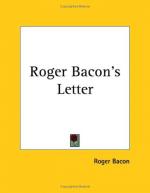|
This section contains 3,579 words (approx. 12 pages at 300 words per page) |

|
SOURCE: "Religion and Science in Roger Bacon," in The Personalist, Vol XXIX, No. 3, Summer, 1948, pp. 261-71.
In the following essay, Mayer discourses upon Bacon's achievement, arguing that Bacon, far from being a dabbler in medieval magic, was a scholar who believed that the pursuit of scientific knowledge was complementary to Christian belief, not antithetical to it.
Until the sixteenth century only three of Bacon's minor works had been printed. The obscurity of his life and his labors in science, together with his aloofness from the affairs of his day, caused his name to be linked with magic. This impression of Bacon dominates Robert Greene's play: Honourable History of Friar Bacon and Friar Bungay. Greene had found a very popular theme that already had been worked out in the Middle Ages. Few of the great scholars like Gerbert of Aurillac, Albertus Magnus, and Roger Bacon escaped the suspicion of...
|
This section contains 3,579 words (approx. 12 pages at 300 words per page) |

|


